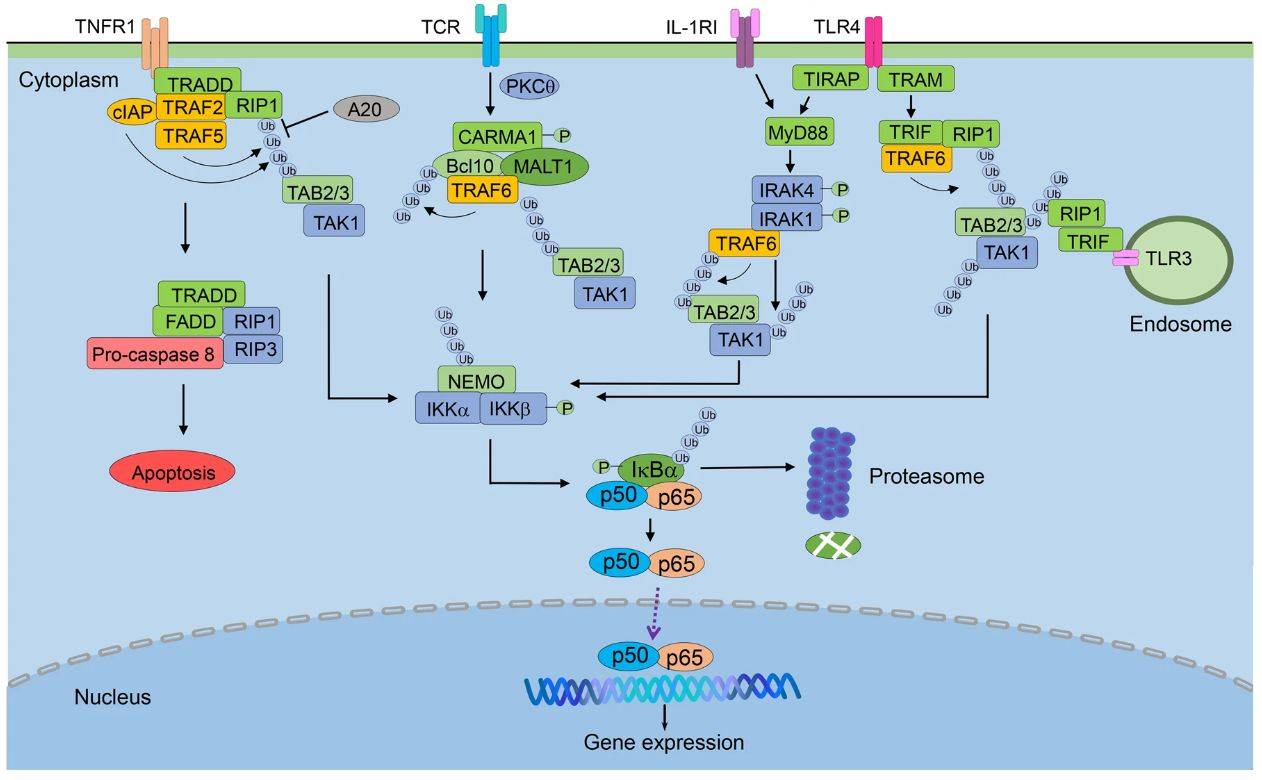What is NFKB1 Protein
The NFKB1 protein, a pivotal member of the NF-κB family, is a transcription factor with diverse roles in cellular regulation.
What is NFKB1 Protein?
NFKB1, or Nuclear Factor Kappa B Subunit 1, is synthesized as a precursor protein, p105, featuring a sophisticated domain structure. The N-terminal Rel homology domain (RHD) governs dimerization, nuclear localization, and DNA binding, essential for its functionality.
The Function of NFKB1 Protein
The multifaceted functions of NFKB1 position it at the nexus of cellular homeostasis. NFKB1 orchestrates the regulation of immune responses, inflammation, cell survival, apoptosis, and cellular differentiation. Through its ability to modulate gene expression, NFKB1 emerges as a central player in maintaining cellular equilibrium.
NFKB1-Related Diseases
- Inflammatory Disorders
NFKB1's dysregulation is closely associated with chronic inflammatory conditions. Rheumatoid arthritis and inflammatory bowel diseases exemplify instances where aberrant NFKB1 activation exacerbates inflammatory responses, contributing to disease pathogenesis.
- Cancer
NFKB1's involvement in cancer is noteworthy, influencing cell survival, proliferation, and resistance to apoptosis. Its dysregulation is a common denominator in various cancer types, emphasizing its significance as a potential therapeutic target.
- Autoimmune Diseases
Autoimmune disorders, including lupus and multiple sclerosis, exhibit overactive immune responses linked to NFKB1 dysregulation. The intricate interplay between NFKB1 and immune processes underscores its role in autoimmune pathologies.
- Neurodegenerative Diseases
Neurodegenerative diseases like Alzheimer's and Parkinson's showcase the impact of NFKB1 in inflammatory processes within the central nervous system. NFKB1 dysregulation contributes to neuroinflammation, potentially exacerbating disease progression.
NFKB1 Related Signaling Pathways
The activation of NFKB1 is intricately woven into a sophisticated signaling pathway. Activation involves IκB kinase (IKK)-mediated phosphorylation of the inhibitory protein IκB, leading to its degradation and subsequent release of active NFKB1. This nuanced cascade is pivotal for understanding NFKB1's regulatory role.

Figure 1. Activation and regulation of canonical NF-κB pathway. (Yu, H., et al. 2020)
Applications of NFKB1 in Biomedical Research
- Drug Development
Targeting NFKB1 in drug development has gained momentum. Small molecules and biological agents that selectively modulate NFKB1 activity are being explored as potential therapeutics. These endeavors aim to mitigate diseases characterized by NFKB1 dysregulation, including cancer and inflammatory disorders.
- Immunotherapy
NFKB1's intricate involvement in immune responses positions it as a promising target for immunotherapy. Manipulating NFKB1 activity holds potential to enhance the efficacy of immunotherapeutic interventions, providing novel avenues for treating various diseases.
- Inflammation Modulation
Given its central role in inflammation, NFKB1 is a prime target for developing anti-inflammatory drugs. Therapies focused on regulating NFKB1 activity could offer relief to individuals suffering from chronic inflammatory conditions, presenting a viable alternative to conventional treatments.
- Neuroprotective Strategies
Understanding NFKB1's role in neurodegenerative diseases opens new avenues for developing neuroprotective strategies. Targeting NFKB1 could potentially impede neuroinflammation, offering a novel approach to slowing down the progression of debilitating conditions like Alzheimer's and Parkinson's.
In the intricate web of cellular regulation, NFKB1 emerges as a linchpin, influencing a myriad of processes that dictate cellular health and disease. From its structural intricacies to its multifaceted functions, NFKB1's significance is underscored by its involvement in diseases and its potential applications in biomedical research. As we delve deeper into the complexities of NFKB1, we pave the way for innovative therapeutic interventions that could revolutionize the landscape of medicine, offering hope for individuals grappling with various pathological conditions.
Recommended Products for NFKB1 Protein
| Cat.# | Species | Product name | Source (Host) | Tag |
|---|---|---|---|---|
| NFKB1-85H | Human | Recombinant Human NFkB-p50 protein, active, GST-tagged | E.coli | GST |
| NFKB1-300H | Human | Recombinant Human NFKB1 protein, MYC/DDK-tagged | HEK293 | Myc/DDK |
| NFKB1-310H | Human | Recombinant Human NFKB1 protein, His/MBP-tagged | E.coli | His/MBP |
| NFKB1-1847H | Human | Recombinant Human NFKB1 protein, His & GST-tagged | E.coli | His/GST |
| NFKB1-3973H | Human | Recombinant Human NFKB1 protein, His-tagged | E.coli | His |
| NFKB1-3742H | Human | Recombinant Human NFKB1 protein, GST-tagged | E.coli | GST |
| Nfkb1-1848M | Mouse | Recombinant Mouse Nfkb1 protein, His & T7-tagged | E.coli | His/T7 |
| Nfkb1-4396M | Mouse | Recombinant Mouse Nfkb1 Protein, Myc/DDK-tagged | HEK293T | Myc/DDK |
| NFKB1-3015R | Rhesus Macaque | Recombinant Rhesus monkey NFKB1 Protein, His-tagged | Mammalian Cell | His |
| NFKB1-1846C | Chicken | Recombinant Chicken NFKB1 protein, His & T7-tagged | E.coli | His/T7 |
Reference
- Yu, H., et al. Targeting NF-κB pathway for the therapy of diseases: mechanism and clinical study. Sig Transduct Target Ther. 2020, 5: 209.

